 |
|||||||||||||||
A Malevolent Confrontation “Star Trek: Nemesis” begins the final voyage for the crew of the Enterprise-E Michelle Evans, December 2002
One of the greatest controversies in psychology is whether someone’s environment or their genetics plays the most important role in how a person becomes who they are. If a person is inherently good, what difference would it make if they were raised amongst thieves or murderers? What if a human were raised by aliens? What if that human happened to be a clone and was later confronted with his genetically identical progenitor, who might not even be aware of his existence?
Certainly these are wild hypotheses to contemplate, but then, that is what interests many of us within the Orange County Space Society. How can things be different? What can we do to change things? Will our actions bring about a better future for ourselves and for humanity?
Science fiction plays a major role in answering these types of what-if questions. We have to admit that there are few venues within science fiction that have done it better and longer than the Star Trek franchise. So, when the opportunity presented itself through publicist Warren Betts and Paramount Pictures to participate in the premiere of the tenth motion picture installment of Star Trek, I considered that it would be a wonderful holiday treat for our readers to get a more personal connection with the people who make it all happen.
Over the weekend prior to Thanksgiving I flew back to New York City to attend a press screening of “Star Trek: Nemesis” at the AMC Empire Theater. Another OCSS Board member, Ivor Dawson, was also able to attend, along with his friend Vilma Babb. Within our group, and from the reactions of other members of the press also in attendance, the new movie is going to be a hit when it opens nationwide on Friday, December 13th.
The following day I had the opportunity to interview several of the cast members, along with the writer, producer, and director.
I asked Patrick Stewart, who plays Captain Jean-Luc Picard, if he had received any feedback on “Nemesis” yet.
“The one thing I’ve heard,” Stewart told me, “which pleased me enormously, was that there was a certain amount of emotion experienced at the end of the movie. Any feelings that are expressed toward any project are good, especially amongst reviewers and critics.
“We know that the ending of the movie has an emotional intensity. I feel it each time that I see it. That’s gratifying. I do feel that something a little different has happened with this film. And to a very great extent, John Logan has to take an enormous responsibility for this. It was an act of genius to bring him on board to write the screenplay, not only because he is one of the very best writers in Hollywood today, but because he is a huge Star Trek fan. He certainly knows the series better than I do and he has a great affection for the characters.”
John Logan is not just a fan of Star Trek, he is also the screenwriter of the Oscar-winning movie “Gladiator.” To give you some idea of the depth of his writing skills, other projects John is currently involved with include one about Abraham Lincoln for Steven Spielberg; “The Aviator,” a story about Howard Hughes for Martin Scorsese; “Gladiator II” for Ridley Scott; and “The Last Samurai” for Tom Cruise. But he is also quick to point out that even though a writer is extremely important on a project such as this, he does not work alone.
“I want to say something that is important to me. And that is that this is not my movie. John Logan did not create ‘Nemesis.’ I was part of a great team and it was my honor to work with people like Rick Berman, Patrick Stewart, Stuart Baird, and all the people who created it.”
But as much as we enjoy seeing new Star Trek episodes on television and in theaters, Brent Spiner, who plays Data, points out succinctly that “Hollywood is about economics and if the movie is successful, I’ll bet you we’ll be back. And if it’s not, then it’s ‘Hasta la vista, baby!’”
Another thing that must be considered when dealing with Star Trek is the original vision of its creator, Gene Roddenberry. I asked Producer Rick Berman about Gene’s legacy and if he considers it a burden?
“Yeah, I do. But that’s really part of the fun. Unlike a lot of television shows, the fact that these shows are provocative and sometimes cause people to think, and that they have this amazing fan base, the letters we get and the feedback we get is remarkable. We have a responsibility to make the shows entertaining and we have a responsibility to occasionally (hopefully not that occasionally) to deal with social issues. One of the benefits of science fiction is that you can take social issues and kind of turn them on their ear and look at them in another way.
“I was very close to Gene and Star Trek is not my vision in any way, it’s his vision. I think that in everything we do, whether it’s the movies or the television show, we always try to think, ‘What would Gene think?’ We don’t do that everyday, but we do it enough. I know that John Logan certainly followed that philosophy while we were putting together this script.”
With Star Trek entrenched for nearly four decades, is it hard for someone with basically no knowledge of it to step into the role of Director? Stuart Baird (“U.S. Marshals”) said that “I realized I was walking in there with something that already has this huge fan base, so I’m not going to go in and reinvent the wheel, because the wheel there is working.”
At the same time, being a new member of the cast provides its own challenges. Tom Hardy (Shinzon) was brought on board after an exhaustive search to find someone who could portray a younger, yet skewed version of Jean-Luc Picard. He had to portray Picard as if he were raised completely outside human society by the dark side of the Romulan species, the Reman.
Tom’s screen test consisted of a home video he shot himself in England. Besides having the right height and acceptance of having his head shaved for the part, Tom admitted that when he got to the set to start filming, “I was terrified, quite honestly, that I was going to make a mess of everything.”
He eventually found himself fitting in to the cast and will probably go down in Star Trek lore as a villain second only to Ricardo Montalban in “Star Trek II: The Wrath of Khan.”
Even though Star Trek does not physically put people into space, the inspiration it has provided to us over the past 36 years has certainly given us a future to shoot for. John Logan explained that he had been one of those people inspired by Star Trek since the very first episode in September 1966. I asked him that if it was an emotional experience for him to grow up with Star Trek, how does he feel about that in reality? Does he feel that the stories he writes will inspire people to explore?
“Wow,” John exclaimed. “I’ve never actually thought about it in that context. But certainly, in the larger philosophical context, what Star Trek means to me and to a lot of fans is that Star Trek is a future of hope, a future where the Prime Directive is exploration, discovery, and compassion. It is not a future of warfare, territorialism, and mercenary maneuvering. In this world I find that very satisfying to think about, to dream about. We may not live to see it, but how nice to think it might be that way.” XXXX |
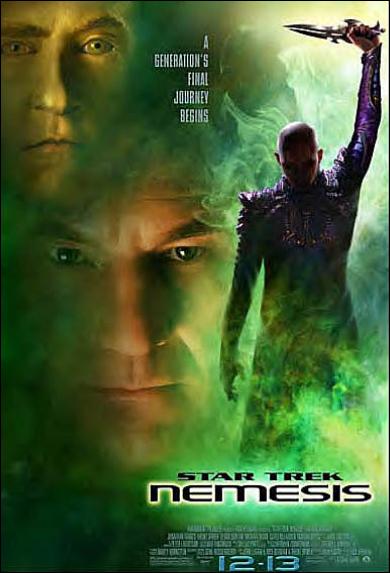 |
|||||||||||||
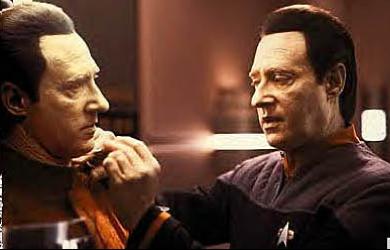 |
||||||||||||||
|
||||||||||||||
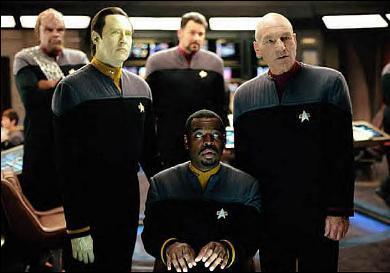 |
||||||||||||||
|
||||||||||||||
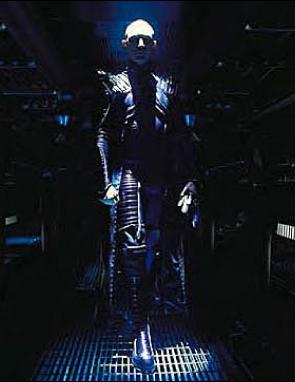 |
||||||||||||||
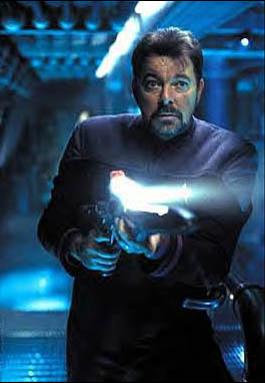 |
||||||||||||||
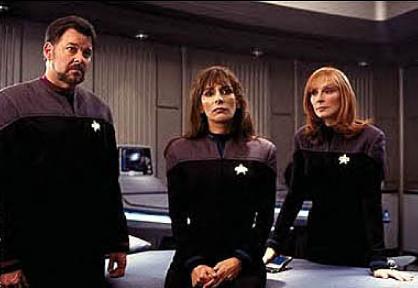 |
||||||||||||||
|
||||||||||||||
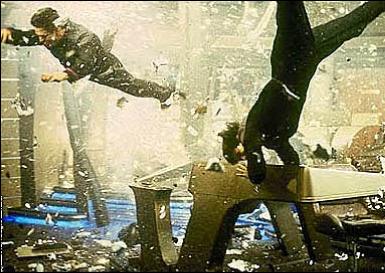 |
||||||||||||||
|
||||||||||||||
|
|
|||